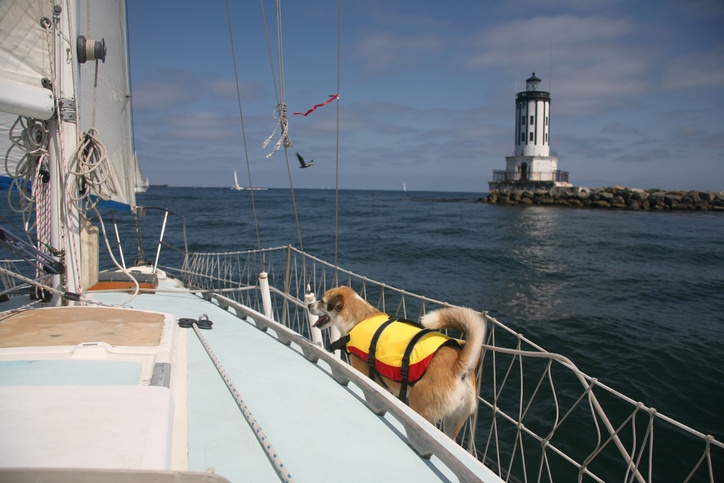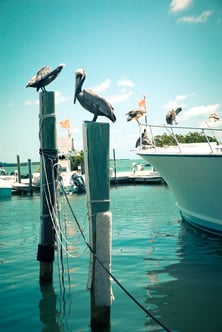 From seasoned boaters to novices planning to take a turn at the wheel, consumer boating experience varies considerably. With each sale, boating dealers hand over the keys to years of memorable summers on a lake, or an accident in the making. Regardless of skill, all consumers can benefit from reviewing safety procedures and precautions. Boating dealers can discuss boating safety at the time of sale to help ensure safe-and-satisfied consumers and increase customer retention rates.
From seasoned boaters to novices planning to take a turn at the wheel, consumer boating experience varies considerably. With each sale, boating dealers hand over the keys to years of memorable summers on a lake, or an accident in the making. Regardless of skill, all consumers can benefit from reviewing safety procedures and precautions. Boating dealers can discuss boating safety at the time of sale to help ensure safe-and-satisfied consumers and increase customer retention rates.
Of the 4,463 boating accidents counted by the U.S. Coast Guard in 2016, 701 involved deaths and 2,903 involved injuries. Recreational boating accidents in 2016 cost consumers approximately $49 million dollars in property damage, the U.S. Coast Guard reports. In response to the need for an increased awareness of boating safety, the CrossCheck editorial team has shortlisted safety advice from industry experts in our top five safety tips below.
Life Jacket Safety
Life jackets save lives, yet boaters across the country continue to forgo the Personal Flotation Device (PFD). According to the U.S. Coast Guard, in 2016, 80 percent of fatal boating accident victims drowned, with 83 percent reported as not wearing a lifejacket. As possibly the single most important boating safety device, wearing a life jacket is a crucial action in safeguarding boaters.
State requirements for life jacket usage vary. Generally, children under 13 must wear a life jacket on moving boats  unless they are below deck or in an enclosed cabin. The National Safe Boating Council recommends that all ages strap on a PFD while on the water.
unless they are below deck or in an enclosed cabin. The National Safe Boating Council recommends that all ages strap on a PFD while on the water.
When choosing a life jacket, one size fits all does not apply. Life vests must be U.S. Coast Guard approved and properly fit the intended wearer. Adult sizes are not suitable for children. A snug life jacket that fits just right with all straps, buckles and or zippers secured is sufficient. Vests must be properly cleaned, stored and in good condition without rips, waterlogging, or mildew, according to the National Safe Boating Council.
Don’t forget about the four-legged boating buddies. A brightly colored dog life jacket will help boaters to see Rufus paddling out in the water and help him stay afloat if he becomes tired. Models with a handle help boaters pull dogs up onto boats and land. If the vest is uncomfortable, dogs will not want to wear it. The snug fit must allow for comfortable movement.
Laws and Regulations
All boaters should know the rules of the waterways. Dealers can encourage customers to familiarize themselves with federal boating laws and regulations, along with U.S. navigation rules and state laws.
Boating Safety Courses
 The U.S. Coast Guard found that in 2016, 77 percent of boating accident deaths “occurred on boats where the operator did not receive boating safety instruction,” while, “only 13 percent of deaths occurred on vessels where the operator had received a nationally-approved boating safety education certificate.”
The U.S. Coast Guard found that in 2016, 77 percent of boating accident deaths “occurred on boats where the operator did not receive boating safety instruction,” while, “only 13 percent of deaths occurred on vessels where the operator had received a nationally-approved boating safety education certificate.”
All boaters share a responsibility to acquire boating education on fundamental operations and safety procedures. Individuals located in states that do not require boating education are advised to complete a safety course before setting out on the water.
The U.S. Coast Guard’s Boating Safety Division presents a comprehensive guide to boat safety course providers. One provider, the Boat U.S. Foundation, offers free online boating safety courses specialized to each state. A sampling of courses for purchase from the Boast U.S. Foundation include “How to use GPS,” “Modern Marine Navigation” and “Weather for Boaters.”
Pre-Departure Checklist
Experts advise boaters to prepare for all possible scenarios before boarding. A pre-departure checklist will make certain that each safety precaution is addressed. A thorough pre-departure list should include all required safety equipment and additional precautions. The Discover Boating program recommends the following:
- Flotation devices — one life jacket for each passenger and an additional PFD on board
- Sound-producing devices — a whistle attached to each life jacket and a portable air horn on deck
- Lights — required navigation lights and a flashlight with spare batteries
- Distress signals — flares, emergency locator beacon,
- Tools — a toolbox outfitted with the appropriate tools and first-aid kit
- Spares — fuel filter, light bulbs, through-hull plugs, etc.
- Full fuel tanks or at least enough to return safely to shore
- Fire extinguisher
- Well-ventilated interior spaces
- Necessary documentation
- Carbon monoxide detector
- Vessel Safety Check
Boaters can schedule a boat safety check with local service providers prior to launch. The National Safe Boating Council suggests the U.S. Coast Guard Auxiliary or the U.S. Power Squadron’s free services. Continual maintenance throughout the boating season is also necessary.
Tips for Boating Dealers
To assist customers in staying safe while boating and increase the likelihood of repeat business, boating dealers can follow CrossCheck’s guide to drive safety talks with customers.
In addition, boating dealers can increase the likelihood of a sale by implementing CrossCheck’s Multiple Check program. With this service, dealers work with customers to create a payment plan that satisfies the needs of both parties. Consumers write 2 – 4 checks on the purchase date that dealers deposit over a 30–day period, allowing consumers time to replenish their checking accounts. Dealers receive guaranteed funding after each check is deposited while consumers can pull boats home on the purchase date. To learn more, download our free guide.



